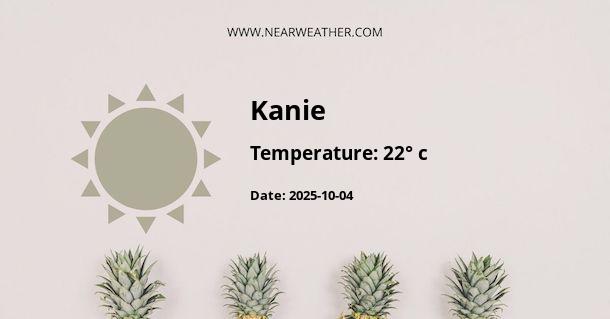Kanie, Japan: Climate and Weather Guide
Kanie is a charming town located in the Aichi Prefecture of Japan. Its picturesque landscapes, historical sites, and proximity to the sea make it an attractive destination for both locals and tourists. Before planning your trip to Kanie, it's essential to understand the climate and weather conditions throughout the year. In this guide, we will provide you with comprehensive information about Kanie's climate, average temperatures, rainfall, and other important weather-related factors.
Geographical Location and Influence on Climate
Kanie is situated on the eastern coast of Japan, approximately 30 kilometers south of Nagoya. Its close proximity to the Pacific Ocean significantly influences its climate. The town experiences a humid subtropical climate, characterized by hot and humid summers and mild winters. The ocean acts as a modulating factor, bringing in moisture and moderating temperature extremes.
Seasonal Temperatures
Let's take a closer look at the average temperatures in Kanie throughout the year:
| Season | Average Temperature (°C) |
|---|---|
| Spring (March - May) | 9°C - 18°C |
| Summer (June - August) | 22°C - 30°C |
| Autumn (September - November) | 14°C - 24°C |
| Winter (December - February) | 2°C - 11°C |
As the table shows, summers in Kanie are warm and humid, with average temperatures ranging from 22°C to 30°C. The highest temperatures are usually recorded in August. Winters, on the other hand, are relatively mild, with average temperatures ranging from 2°C to 11°C. The coldest month is typically January.
Precipitation and Rainfall
Kanie receives a significant amount of rainfall throughout the year, with the wettest months being June and July. Here are the average rainfall levels in Kanie:
| Month | Average Rainfall (mm) |
|---|---|
| January | 40mm |
| February | 65mm |
| March | 95mm |
| April | 135mm |
| May | 175mm |
| June | 235mm |
| July | 195mm |
| August | 150mm |
| September | 215mm |
| October | 140mm |
| November | 55mm |
| December | 45mm |
With the highest rainfall occurring in June, it's important to plan outdoor activities accordingly. The months from July to September also have a significant amount of rainfall, so it's advisable to carry an umbrella or raincoat during this period.
Typhoons
Kanie, like many other coastal regions in Japan, is prone to typhoons during the summer and early autumn months. Typhoons are tropical cyclones that can bring strong winds, heavy rainfall, and rough sea conditions. The typhoon season in Japan usually starts in June and lasts until October, with the peak occurring in August and September.
It is essential to stay updated with the local weather forecasts and follow any instructions or advisories issued by the authorities during typhoon events. It's recommended to avoid traveling to Kanie during the peak typhoon season to ensure your safety and enjoyment of the town.
Best Time to Visit
The best time to visit Kanie is during the spring and autumn seasons when the weather is mild, and rainfall is relatively low. Spring brings beautiful cherry blossoms, while autumn showcases stunning foliage colors. These seasons offer pleasant temperatures for outdoor activities and sightseeing.
Conclusion
Kanie, Japan, experiences a humid subtropical climate with hot and humid summers and mild winters. The town receives significant rainfall throughout the year, with the wettest months being June and July. It is advisable to plan your visit during the spring or autumn seasons for the most enjoyable weather conditions. Keep track of the local weather forecasts and take necessary precautions during the typhoon season. With its charming landscapes and historical sites, Kanie is a delightful destination to explore and experience the beauty of Japan.
A - Kanie's Latitude is 35.133331 & Longitude is 136.800003.
A - Weather in Kanie is 10° today.
A - Climate Conditions in Kanie shows clear sky today.
A - Humidity in Kanie is 51% today.
A - Wind speed in Kanie is 27.86 km/h, flowing at 322° wind direction. today.
